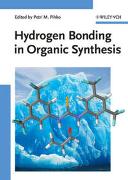Hydrogen Bonding in Organic Synthesis
BücherAngebote / Angebote:
Snow and ice, water droplets, and all key materials of life -- the double strands of DNA and all proteins -- are held together by intermolecular forces called hydrogen bonds. These bonds, although weaker than bonds within molecules, are still strong enough to chaperone molecules into desired orientations, allowing chemists to use them as tools to perform reactions with high selectivity. In addition, hydrogen bonding can lead to metal-free catalysts, thus saving chemicals and energy in an otherwise lengthy purification process while also reducing the heavy metal output in the environment.
This first comprehensive overview of the rapidly growing field emphasizes the use of hydrogen bonding as a tool for organic synthesis, especially catalysis. As such, it covers such topics as enzyme chemistry, organocatalysis and total synthesis, all unified by the unique advantages of hydrogen bonding in the construction of complex molecules from simple precursors.
From the contents:
* Introduction
* Hydrogen Bond Catalysis or Brønsted Acid Catalysis? General Considerations
* Computational Studies of Organocatalytic Processes Based on Hydrogen Bonding
* Oxyanion holes and their mimics
* Brønsted Acids, H-Bond Donors, and Combined Acid Systems in Asymmetric Catalysis
* Hydrogen Bonding in Organic Synthesis - (Thio)urea Organocatalysts
* Highlights of Hydrogen Bonding in Total Synthesis
Providing everything you need to know, this is a definite must for every synthetic chemist in academia and industry.
Lieferbar in ca. 10-20 Arbeitstagen
